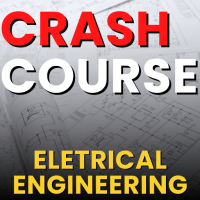Electrical Engineering (EE) Exam > Electrical Engineering (EE) Questions > Single-time-constant (STC) networks are those...
Start Learning for Free
Single-time-constant (STC) networks are those networks that are composed of, or can be reduced to
- a)One reactive component (L or C) and a resistance (R)
- b)Only capacitive component (C) and resistance (R)
- c)Only inductive component (L) and resistance (R)
- d)Reactive components (L, C or both L and C) and resistance (R)
Correct answer is option 'A'. Can you explain this answer?
Verified Answer
Single-time-constant (STC) networks are those networks that are compos...
STC has only one reactive component and one resistive component.
Most Upvoted Answer
Single-time-constant (STC) networks are those networks that are compos...
Single-time-constant (STC) networks are electrical networks that can be characterized by a single time constant, which is the time required for the response of the network to reach a certain percentage of its final value. These networks are commonly encountered in various electrical and electronic systems and are widely used for analysis and design purposes.
The correct answer to the given question is option 'A', which states that STC networks are composed of one reactive component (either an inductor or a capacitor) and a resistance. Let's explore why this is the correct answer in detail:
1. Definition of STC networks:
- STC networks are those networks that exhibit a single time constant in their response behavior.
- The time constant is determined by the values of the reactive component(s) and the resistance in the network.
- The time constant represents the rate at which the network's output or response changes with time.
2. Reactive components and their behavior:
- Reactive components include inductors (L) and capacitors (C).
- Inductors store energy in a magnetic field and oppose changes in current.
- Capacitors store energy in an electric field and oppose changes in voltage.
- Both inductors and capacitors exhibit reactive behavior, meaning their impedance varies with frequency.
3. Resistance in STC networks:
- Resistance (R) is a passive component that dissipates energy in the form of heat.
- It does not store energy like inductors and capacitors.
- Resistance determines the overall behavior and characteristics of the STC network.
4. Reduction to a single time constant:
- STC networks can be reduced to a single time constant by considering the dominant reactive component and the resistance.
- The dominant component is the one with a larger reactance at the operating frequency.
- The time constant is determined by the product of the dominant component's value and the resistance.
5. Why option 'A' is correct:
- Option 'A' states that STC networks are composed of one reactive component (L or C) and a resistance (R).
- This is true because a single reactive component and a resistance are sufficient to determine the time constant and overall behavior of an STC network.
- If there are multiple reactive components (L and C), their combined effects can still be represented by a single effective reactive component.
In conclusion, option 'A' is the correct answer because STC networks can be composed of a single reactive component (either an inductor or a capacitor) and a resistance. These components determine the time constant and overall behavior of the network, allowing for analysis and design purposes.
The correct answer to the given question is option 'A', which states that STC networks are composed of one reactive component (either an inductor or a capacitor) and a resistance. Let's explore why this is the correct answer in detail:
1. Definition of STC networks:
- STC networks are those networks that exhibit a single time constant in their response behavior.
- The time constant is determined by the values of the reactive component(s) and the resistance in the network.
- The time constant represents the rate at which the network's output or response changes with time.
2. Reactive components and their behavior:
- Reactive components include inductors (L) and capacitors (C).
- Inductors store energy in a magnetic field and oppose changes in current.
- Capacitors store energy in an electric field and oppose changes in voltage.
- Both inductors and capacitors exhibit reactive behavior, meaning their impedance varies with frequency.
3. Resistance in STC networks:
- Resistance (R) is a passive component that dissipates energy in the form of heat.
- It does not store energy like inductors and capacitors.
- Resistance determines the overall behavior and characteristics of the STC network.
4. Reduction to a single time constant:
- STC networks can be reduced to a single time constant by considering the dominant reactive component and the resistance.
- The dominant component is the one with a larger reactance at the operating frequency.
- The time constant is determined by the product of the dominant component's value and the resistance.
5. Why option 'A' is correct:
- Option 'A' states that STC networks are composed of one reactive component (L or C) and a resistance (R).
- This is true because a single reactive component and a resistance are sufficient to determine the time constant and overall behavior of an STC network.
- If there are multiple reactive components (L and C), their combined effects can still be represented by a single effective reactive component.
In conclusion, option 'A' is the correct answer because STC networks can be composed of a single reactive component (either an inductor or a capacitor) and a resistance. These components determine the time constant and overall behavior of the network, allowing for analysis and design purposes.

|
Explore Courses for Electrical Engineering (EE) exam
|

|
Question Description
Single-time-constant (STC) networks are those networks that are composed of, or can be reduced toa)One reactive component (L or C) and a resistance (R)b)Only capacitive component (C) and resistance (R)c)Only inductive component (L) and resistance (R)d)Reactive components (L, C or both L and C) and resistance (R)Correct answer is option 'A'. Can you explain this answer? for Electrical Engineering (EE) 2025 is part of Electrical Engineering (EE) preparation. The Question and answers have been prepared according to the Electrical Engineering (EE) exam syllabus. Information about Single-time-constant (STC) networks are those networks that are composed of, or can be reduced toa)One reactive component (L or C) and a resistance (R)b)Only capacitive component (C) and resistance (R)c)Only inductive component (L) and resistance (R)d)Reactive components (L, C or both L and C) and resistance (R)Correct answer is option 'A'. Can you explain this answer? covers all topics & solutions for Electrical Engineering (EE) 2025 Exam. Find important definitions, questions, meanings, examples, exercises and tests below for Single-time-constant (STC) networks are those networks that are composed of, or can be reduced toa)One reactive component (L or C) and a resistance (R)b)Only capacitive component (C) and resistance (R)c)Only inductive component (L) and resistance (R)d)Reactive components (L, C or both L and C) and resistance (R)Correct answer is option 'A'. Can you explain this answer?.
Single-time-constant (STC) networks are those networks that are composed of, or can be reduced toa)One reactive component (L or C) and a resistance (R)b)Only capacitive component (C) and resistance (R)c)Only inductive component (L) and resistance (R)d)Reactive components (L, C or both L and C) and resistance (R)Correct answer is option 'A'. Can you explain this answer? for Electrical Engineering (EE) 2025 is part of Electrical Engineering (EE) preparation. The Question and answers have been prepared according to the Electrical Engineering (EE) exam syllabus. Information about Single-time-constant (STC) networks are those networks that are composed of, or can be reduced toa)One reactive component (L or C) and a resistance (R)b)Only capacitive component (C) and resistance (R)c)Only inductive component (L) and resistance (R)d)Reactive components (L, C or both L and C) and resistance (R)Correct answer is option 'A'. Can you explain this answer? covers all topics & solutions for Electrical Engineering (EE) 2025 Exam. Find important definitions, questions, meanings, examples, exercises and tests below for Single-time-constant (STC) networks are those networks that are composed of, or can be reduced toa)One reactive component (L or C) and a resistance (R)b)Only capacitive component (C) and resistance (R)c)Only inductive component (L) and resistance (R)d)Reactive components (L, C or both L and C) and resistance (R)Correct answer is option 'A'. Can you explain this answer?.
Solutions for Single-time-constant (STC) networks are those networks that are composed of, or can be reduced toa)One reactive component (L or C) and a resistance (R)b)Only capacitive component (C) and resistance (R)c)Only inductive component (L) and resistance (R)d)Reactive components (L, C or both L and C) and resistance (R)Correct answer is option 'A'. Can you explain this answer? in English & in Hindi are available as part of our courses for Electrical Engineering (EE).
Download more important topics, notes, lectures and mock test series for Electrical Engineering (EE) Exam by signing up for free.
Here you can find the meaning of Single-time-constant (STC) networks are those networks that are composed of, or can be reduced toa)One reactive component (L or C) and a resistance (R)b)Only capacitive component (C) and resistance (R)c)Only inductive component (L) and resistance (R)d)Reactive components (L, C or both L and C) and resistance (R)Correct answer is option 'A'. Can you explain this answer? defined & explained in the simplest way possible. Besides giving the explanation of
Single-time-constant (STC) networks are those networks that are composed of, or can be reduced toa)One reactive component (L or C) and a resistance (R)b)Only capacitive component (C) and resistance (R)c)Only inductive component (L) and resistance (R)d)Reactive components (L, C or both L and C) and resistance (R)Correct answer is option 'A'. Can you explain this answer?, a detailed solution for Single-time-constant (STC) networks are those networks that are composed of, or can be reduced toa)One reactive component (L or C) and a resistance (R)b)Only capacitive component (C) and resistance (R)c)Only inductive component (L) and resistance (R)d)Reactive components (L, C or both L and C) and resistance (R)Correct answer is option 'A'. Can you explain this answer? has been provided alongside types of Single-time-constant (STC) networks are those networks that are composed of, or can be reduced toa)One reactive component (L or C) and a resistance (R)b)Only capacitive component (C) and resistance (R)c)Only inductive component (L) and resistance (R)d)Reactive components (L, C or both L and C) and resistance (R)Correct answer is option 'A'. Can you explain this answer? theory, EduRev gives you an
ample number of questions to practice Single-time-constant (STC) networks are those networks that are composed of, or can be reduced toa)One reactive component (L or C) and a resistance (R)b)Only capacitive component (C) and resistance (R)c)Only inductive component (L) and resistance (R)d)Reactive components (L, C or both L and C) and resistance (R)Correct answer is option 'A'. Can you explain this answer? tests, examples and also practice Electrical Engineering (EE) tests.

|
Explore Courses for Electrical Engineering (EE) exam
|

|
Signup for Free!
Signup to see your scores go up within 7 days! Learn & Practice with 1000+ FREE Notes, Videos & Tests.


















